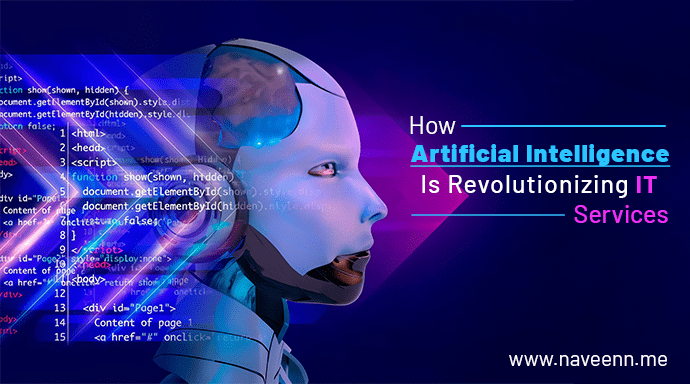In the modern digital age, Artificial Intelligence is transforming industries at an unprecedented pace. Among these, the IT services industry stands out as one of the most impacted sectors. AI has redefined how businesses manage data, secure networks, automate processes, and enhance user experiences. From AI-driven automation to predictive analytics, IT services are evolving faster than ever before. In this article, we will explore how AI is revolutionizing IT services and why businesses need to adapt to this technological shift.
AI in IT Automation
One of the biggest contributions of AI to IT services is automation. AI-powered systems can handle repetitive and time-consuming tasks without human intervention. This includes:
Automated software deployment – AI can assist in deploying applications seamlessly across multiple environments.
Automated troubleshooting – AI-based tools can diagnose and fix common IT issues, reducing downtime.
Self-healing systems – AI-driven monitoring tools can predict failures and resolve them before they impact users.
By automating these tasks, IT professionals can focus on more complex problem-solving, leading to increased efficiency and productivity.
AI-Powered Cybersecurity
Cybersecurity threats are becoming more sophisticated, making traditional security measures inadequate. AI is playing a crucial role in enhancing cybersecurity through:
Threat detection – AI can analyze patterns and detect potential threats in real-time.
Anomaly detection – AI can identify unusual behaviors in networks and flag potential security breaches.
Automated response – AI-driven security systems can automatically respond to threats, preventing data breaches before they happen.
AI-powered cybersecurity solutions significantly reduce risks by continuously learning and adapting to new threats, making IT environments more secure.
AI in IT Support and Chatbots
AI-driven chatbots and virtual assistants have transformed IT support services by offering instant solutions to user queries. Benefits include:
24/7 availability – Unlike human agents, AI-powered bots can provide support round-the-clock.
Instant troubleshooting – AI chatbots can offer quick solutions to common IT problems.
Personalized assistance – AI can analyze user history to provide customized support recommendations.
This leads to faster issue resolution, improved customer satisfaction, and reduced operational costs.
Predictive Analytics in IT Services
AI is reshaping IT services through predictive analytics, helping businesses make data-driven decisions. Key applications include:
System performance monitoring – AI predicts when hardware or software will fail, allowing preemptive action.
User behavior analysis – AI can track and predict how users interact with applications, improving UI/UX design.
Capacity planning – AI helps IT teams optimize resource allocation by forecasting demand.
Predictive analytics ensures proactive problem-solving, minimizing downtime and optimizing performance.
AI in Cloud Computing
The combination of AI and cloud computing has led to more efficient IT operations. AI enhances cloud services by:
Optimizing cloud resource usage – AI helps in balancing workloads and managing cloud storage efficiently.
Enhancing cloud security – AI-powered security tools safeguard cloud environments from cyber threats.
Automated scaling – AI enables auto-scaling of cloud infrastructure based on demand.
These advancements ensure that businesses can reduce costs while maintaining high performance and security.
AI and DevOps Transformation
AI is accelerating the DevOps process by introducing automation in software development and deployment. AI-driven DevOps benefits include:
- Faster software releases – AI automates testing and deployment, reducing time-to-market.
- Code quality improvement – AI can analyze code for errors and suggest improvements.
- Enhanced monitoring – AI continuously monitors applications for performance issues.
By integrating AI into DevOps, organizations can deliver high-quality software faster and more efficiently.
AI in Data Management and Processing
With the exponential growth of data, AI-powered data management is essential for IT services. AI helps in:
- Data classification and organization – AI can categorize large datasets, making them easier to manage.
- Real-time data processing – AI can analyze and process data in real-time for faster decision-making.
- Data security and compliance – AI ensures sensitive data is protected and meets compliance regulations.
By leveraging AI, businesses can extract valuable insights from data while ensuring security and compliance.
AI and IT Infrastructure Management
AI is playing a crucial role in IT infrastructure management, allowing businesses to optimize their IT operations. AI-powered solutions help with:
Predictive maintenance – AI detects potential hardware failures before they occur.
Energy efficiency – AI optimizes power usage in data centers, reducing operational costs.
Resource allocation – AI ensures efficient utilization of IT resources.
With AI, IT infrastructure becomes more cost-effective, resilient, and scalable.
AI in Software Testing
AI has revolutionized software testing, making the process faster and more reliable. Benefits include:
- Automated test case generation – AI generates test cases based on historical data.
- Defect detection – AI identifies software bugs faster than manual testing.
- Performance testing – AI analyzes software performance under various conditions.
AI-driven testing tools reduce human effort, improve accuracy, and speed up software releases.
The Future of AI in IT Services
The future of AI in IT services looks promising, with advancements in:
- AI-powered IT governance – AI will help enforce IT policies and compliance automatically.
- Hyper Automation – AI will integrate with robotic process automation (RPA) for end-to-end automation.
- AI-driven IT strategy – AI will assist in IT decision-making, predicting trends and optimizing strategies.
Businesses that adopt AI-driven IT solutions will gain a competitive edge, improve efficiency, and enhance user experience.
Conclusion
AI is revolutionizing IT services by improving automation, cybersecurity, predictive analytics, cloud computing, DevOps, data management, infrastructure management, and software testing. Organizations that leverage AI-driven IT solutions can boost efficiency, reduce costs, and enhance security. As AI continues to evolve, it will unlock new opportunities and redefine the IT landscape. Now is the time for businesses to embrace AI and stay ahead in the digital transformation journey.
